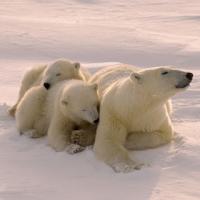Whether you’re a conservationist or a climate change denier, undoubtedly you’ve been following the ongoing efforts to officially declare Ursus maritimus (also known as the polar bear) listed as an endangered species, under the US Endangered Species Act.
In 2005, the Center for Biological Diversity petitioned for the polar bear’s protection, based on research done by climate and wildlife experts worldwide (pdf). Indeed, there is international scientific agreement that the polar bear is heading toward extinction unless it is protected (details here). At last, in 2006, the US Fish and Wildlife Service responded to the Center’s petition, and proposed that the polar bear be listed as endangered.
Predictably, those interested more in the welfare of the fossil fuel industry than in the survival of the polar bears have been doing their best to prevent the bears from being protected.
To make a long story short, there was an initial Senate hearing in which Senator James Inhofe and a carefully chosen “expert” did their best to confuse the issuefollow-up hearing investigating the Bush administration’s foot-dragging (to which a senior official didn’t even bother to show up ). Finally, a federal judge put her foot down and ordered the Department of the Interior to make a final decision by May 15, 2008.
Which leads us to the latest attempt by lawmakers to keep the bears off the endangered list. If the science shows something you don’t like, why, you pay scientists to come up with conclusions that match your business interests.
The Alaska State Legislature has decided to go “scientist” shopping:
Republican legislative leaders say a federal decision to declare the polar bears “threatened” by climate change would have troubling effects on Arctic oil development and the state’s economic future.
[…]
Legislative leaders said they are frustrated that researchers skeptical of the doomsday scenario get marginalized as crackpots or industry shills by the media and scientific agencies. “We want to have the money to hire scientists to answer the Interior (Department) scientists,” House Speaker John Harris, R-Valdez, said last week.
In other words, they want a few good climate change deniers to present “proof” that the Interior Department scientists are wrong.
Both House Speaker Harris and Senate President Lyda Green are behind the request for the $2 million. Notably, Green was a co-sponsor of a 2007 Senate Resolution to oppose listing the polar bear as threatened.
At least Harris is honest about their motives, and what he thinks of scientists:
“You know as well as I do that scientists are like lawyers,” Harris said.
Rick Steiner is a conservation scientist at the University of Alaska. For months, he has been attempting to get Alaska state officials to make public any scientific reasons they have for preventing the protection of polar bears:
On Friday [May 2, 2008], Steiner released a long chain of e-mail correspondence, saying the state first promised to send internal documents and then refused. The state Department of Law is now reviewing the internal memos from scientists to see if they can be released under the state’s open records laws.
“It is stunningly hypocritical that the state will spend $2 million to convene a scientific conference on this issue, but they will not release their own scientific analysis,” Steiner said.
At the end of the Anchorage Daily News article, there is a summary of a conference call (with Harris and Green). Note the part I’ve highlighted in bold:
Non-biased? Since when were climate change skeptics “non-biased”? By definition, this conference is being paid for and convened to dispute extensive research that proves polar bears are endangered, to provide a platform for those tired old denier talking points with which we are so familiar.
Stay tuned. I’m sure we’ll see soon enough that the “experts” they’ll call aren’t exactly “non-biased”.
Subscribe to our newsletter
Stay up to date with DeSmog news and alerts






